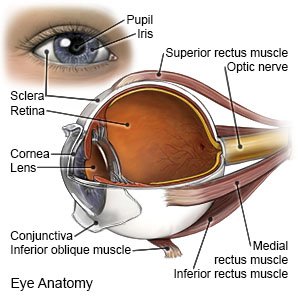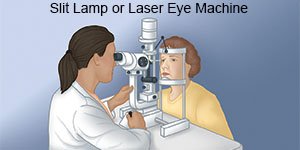Laser Surgery for Glaucoma
Medically reviewed by Drugs.com. Last updated on Apr 6, 2025.
WHAT YOU NEED TO KNOW:
Laser surgery for glaucoma is used to open your eye drainage system, or create a new drainage system. Glaucoma is caused by fluid buildup behind the eye. This surgery helps decrease eye pressure and slow or prevent more damage and vision loss. You may need surgery on one or both eyes.
 |
HOW TO PREPARE:
Before your surgery:
- You may need to see your eye doctor 1 to 4 days before surgery for a complete eye exam.
- Arrange for someone to drive you home and stay with you for at least 24 hours after surgery.
- Do not drink alcohol for 48 hours before surgery.
The day of your surgery:
- Use your eye drops and other medicines as directed. Bring your medicines with you to your surgery.
- Do not wear contact lenses, earrings, or hearing aids.
- Do not wear makeup or lotion on your face.
- You may eat a light meal before your laser treatment. Avoid heavy or greasy foods.
- You or a close family member will be asked to sign a legal document called a consent form. It gives the surgeon permission to do the surgery. It also explains the risks and your choices. Make sure all your questions are answered before you sign this form.
WHAT WILL HAPPEN:
What will happen:
You will be given eye drops to numb your eye. You will sit in a chair in front of a slit lamp. A slit lamp is the instrument eye doctors use to look in your eye. The laser machine is attached to the slit lamp. Your eye doctor may use a face holder to help keep your head still during surgery. He or she will put a contact lens on your eye to aim the laser on the areas to be treated. During the treatment, you will see flashes of colored light. Laser surgery may be done more than 1 time. You may have one of the following types of laser surgery:
- Trabeculoplasty is used to open clogged areas of your eye drainage system. This will help fluid drain from your eye and decrease pressure.
- Trabeculotomy is used to remove tissue to help fluid drain more easily.
- Iridotomy is used to make a tiny hole in your iris. The iris is the colored part of your eye. This will allow fluid to drain from your eye and decrease pressure.
 |
After your surgery:
Your eye doctor will put eye drops or ointment in your eye to decrease inflammation. He or she will check your eye pressure. You will be taken to a room where you can rest after your surgery. You will be able to go home when your eye doctor says it is okay.
CONTACT YOUR HEALTHCARE PROVIDER IF:
- You have a fever.
- You have questions or concerns about your surgery.
Risks
You may get an infection and your eye may bleed. Your eye pressure may not get better and could become worse. Your vision may be worse than before the surgery. You may not be able to have another laser surgery for your glaucoma. You may develop cataracts (cloudy, dark vision) after laser surgery.
Drugs used to treat this and similar conditions
Combigan
Combigan (brimonidine and timolol) is used to treat glaucoma or ocular hypertension. Includes ...
Zioptan
Zioptan (tafluprost eye drops) is used to reduce elevated intraocular pressure in patients with ...
Ozempic
Learn about Ozempic (semaglutide) for type 2 diabetes treatment, weight management, cardiovascular ...
Vyzulta
Vyzulta is used for glaucoma, open angle, glaucoma/intraocular hypertension
Pilocar
Pilocar is used for glaucoma, glaucoma, narrow angle, glaucoma, open angle, intraocular ...
Nadolol
Nadolol systemic is used for angina, anxiety, benign essential tremor, esophageal variceal ...
Tafluprost ophthalmic
Tafluprost ophthalmic is used for glaucoma, open angle, glaucoma/intraocular hypertension ...
Pilocarpine ophthalmic
Pilocarpine ophthalmic is used for glaucoma, glaucoma, narrow angle, glaucoma, open angle ...
Latanoprostene bunod ophthalmic
Latanoprostene bunod ophthalmic is used for glaucoma, open angle, glaucoma/intraocular hypertension
Care Agreement
You have the right to help plan your care. Learn about your health condition and how it may be treated. Discuss treatment options with your healthcare providers to decide what care you want to receive. You always have the right to refuse treatment.© Copyright Merative 2025 Information is for End User's use only and may not be sold, redistributed or otherwise used for commercial purposes.
The above information is an educational aid only. It is not intended as medical advice for individual conditions or treatments. Talk to your doctor, nurse or pharmacist before following any medical regimen to see if it is safe and effective for you.
Further information
Always consult your healthcare provider to ensure the information displayed on this page applies to your personal circumstances.
